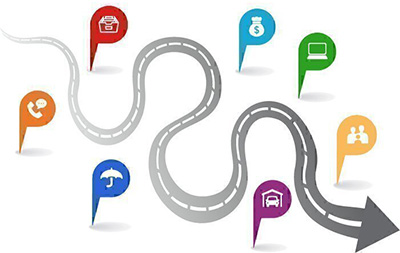Creating a Roadmap for Your Heirs
Last updated December 2021
Online banking is incredibly convenient (goodbye writing checks and hunting for stamps!). And paperless statements reduce waste. But these improvements can lead to an enormous challenge for your heirs: locating all your assets after you die.
Tracking down a decedent’s assets has always required some detective work. Before the digital era, heirs had to look through files and check mail. Now, when there’s no paper trail, sleuthing is considerably more difficult.
“It’s a huge problem; it happens all the time,” said Jeffrey D. Katz, an attorney who specializes in estate law. “And what’s really frustrating is that it’s a completely avoidable problem.”
If you don’t document your financial affairs, your heirs will have to pay professionals to hunt for them or, in some cases, assets will neither be found nor allocated.
Searching for assets using a Social Security number seems like a simple option; after all, you need to provide one to open just about any type of account. But although the executor of an estate can ask individual banks and other institutions to search for accounts, and can check for property records and unclaimed assets with local and state governments, there’s no national database logging everyone’s info.
The website MissingMoney.com ties together states’ unclaimed property databases and might help you identify accounts and unclaimed property owned by you or a predecessor. But banks, financial institutions, and other companies often are slow to report dormant accounts to these registries.
Fortunately, finding a financial asset is easy if it paid interest or dividends; that income was reported to the IRS, which can provide executors with transcripts of tax returns that include sources of earnings. But if you hold a long-term CD, bond, stock shares, or other assets that don’t pay interest or dividends, and you haven’t realized any gains and won’t for some time, they won’t be listed on past tax returns and heirs may not learn about their existence.
Checking mail and email for statements is also an option. But some types of investments don’t send them. And sometimes accounts get set up to hide assets, either for privacy concerns or to avoid taxes. Cryptocurrency holdings present an enormous problem for many estate attorneys and executors—the internet is awash in tales of families that inherited crypto worth millions or even billions of dollars but can’t access it because they don’t have the passkeys to unlock their digital vaults.
Another reason to document what you have is to reduce the risk of theft. Katz warned that sometimes assets go missing immediately after a death, and that unsecured or unknown possessions are the most susceptible.
Katz urged that “the key is communication and to do this work now, while you’re healthy. Often mom and dad made a plan but remained tight-lipped about it. Then, later on when things change, it’s too late to tell their kids how to find everything.”
To prevent this mess, make a list of what you have; the checklist below tells you what to include. For financial services, list only institutions where you have accounts and the types; don’t include account numbers, user IDs, or passwords. As we’ve previously reported, many investment and retirement firms offer their accountholders shockingly weak protections from fraud and theft. If you share your passwords to these types of accounts, even with a trusted attorney or heir, that could disqualify you from getting reimbursed if a theft occurs.
If you’re married, unless you make other arrangements, most of your assets immediately transfer to your spouse. If you’re unmarried, instruct financial institutions to make any savings, checking, or investment accounts transferable upon your death to your named chosen heirs. This is an easy task that will eliminate a lengthy wait for probate.
What to Include on Your Financial Roadmap
Give copies of your end-of-life documents—will, durable power of attorney, healthcare choices, living will, medical info release—to your estate’s executor, attorney, primary heir(s), and a few close friends.
To help them unravel your finances, maintain (and update, as necessary) a list of your major assets and the names of financial institutions where you have accounts—but don’t share any user IDs and passwords.
 Your roadmap should include:
Your roadmap should include:
Contact Information
- Immediate family members and heirs; your choice of guardians for children; attorneys, accountants, and executor
Personal Preferences
- Funeral preferences
- What happens to pets
Legal Document Locations
- Will and any trusts
- Tax returns for at least five years
- Birth certificates for you and any children
- Death certificates of any immediate family
- Marriage certificates
- Divorce decrees
- Adoption paperwork
- Legal documents
- Vehicle titles
- Business contracts
-
Financial Institutions (List Names and Types of Accounts):
- Credit card accounts
- Bank accounts
- Investment accounts
- Locations of safe deposit boxes
- Combination to safe
- Savings bonds or other investment certificates
- Mortgages and home equity loans
- Vehicle loans
- Personal loan arrangements you’ve made
- Pensions and retirement accounts
- Flexible spending accounts (FSAs)
- Accounts enrolled in autopay arrangements (Amazon Prime, cell phone, etc.)
Insurance Policies
- Health insurance policies
- Life insurance and annuity policies
- Long-term care insurance policies
- Home and auto policies
Passwords
- Master password for password management software (make sure recipients carefully safeguard this)
- Passwords to social media accounts and instructions on what to do with them
- Passwords to phone, computer, and other devices
- Cloud storage accounts and passwords
Physical Property
- List items worth more than $500 (jewelry, cars, electronics, antiques, artwork, collectibles); if you want someone to inherit a specific item or asset, make sure your will indicates that wish

